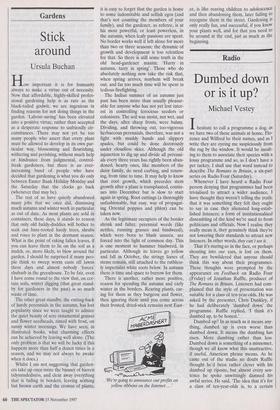Gardens
Stick around
Ursula Buchan
How important it is for humanity always to make a virtue out of necessity. Now that affordable, highly-skilled profes- sional gardening help is as rare as the black-tailed godwit, we are ingenious in finding reasons for not doing things in the garden. 'Labour-saving' has been elevated into a positive virtue, rather than accepted as a desperate response to unfriendly cir- cumstances. There may not yet be too many people who assert that every plant must be allowed to develop in its own par- ticular way, blossoming and flourishing, withering and perishing, without much help or hindrance from judgmental, control- freak gardeners, but there is an ever- increasing band of people who have decided that gardening is what you do only between Easter Bank Holiday Monday and the Saturday that the clocks go back (whenever that may be).
The rest of us have quietly abandoned many jobs that we once did, dismissing much autumn and winter work in particular as out of date. As most plants are sold in containers, these days, it stands to reason that only old fuddy-duddies will bother to seek out bare-rooted hardy trees, shrubs and roses to plant in the dormant season. What is the point of raking fallen leaves, if you can leave them to lie on the soil as a mulch, or, more likely, to blow around the garden. I should be surprised if many peo- ple think to sweep worm casts off lawns these days and almost nobody 'forces' rhubarb in the greenhouse. To be fair, even I have come round to the view that, on cer- tain soils, winter digging (that great stand- by for gardeners in the past) is so much waste of time.
The other great standby, the cutting-back of hardy perennials in the autumn, has lost popularity since we were taught to admire the quiet beauty of sere ornamental grasses and flower seedheads, rimed with frost, on sunny winter mornings. We have seen, in illustrated books, what charming effects can be achieved by leaving well alone. (The only problem is that we will be lucky if this happens more than half a dozen times in a season, and we may not always be awake when it does.) Whilst I am not suggesting that garden- ers take up once more the banner of barren tidymindedness, and clear away everything that is fading in borders, leaving nothing but brown earth and the crowns of plants, it is easy to forget that the garden is home to some indomitable and selfish egos (and that's not counting the members of your family), and the gardener, as referee, is at his most powerful, or least powerless, in the autumn, when leafy passions are spent. No border works well if left alone for more than two or three seasons; the dynamic of growth and development is too relentless for that. So there is still some truth in the old head-gardener maxim: 'Hurry in autumn, tarry in spring'. Those who do absolutely nothing now take the risk that, when spring arrives, mayhem will break out, and far too much time will be spent in tedious firefighting.
The Indian summer of an autumn just past has been more than usually pleasur- able for anyone who has not yet lost inter- est in controlling ferocious seeders or colonisers. The soil was moist, not wet, and the days, after sharp frosts, were balmy. Dividing, and throwing out, too-vigorous herbaceous perennials, therefore, was not a fight with muddy hands and slippery spades, but could be done decorously under cloudless skies. Although the old injunction to dig up and divide all perenni- als every three years has rightly been aban- doned, hearty ones, like members of the daisy family, do need curbing, and renew- ing, from time to time. It may help to know that root growth, which precedes stem growth after a plant is transplanted, contin- ues into December but is slow to start again in spring. Root cuttings (a thoroughly unfashionable, but easy, way of propagat- ing Oriental poppies and phlox) can be taken now.
As the legitimate occupiers of the border shrink and falter, perennial weeds (like nettles, running grasses and bindweed), which were born to blush unseen, are forced into the light of common day. This is one moment to hammer bindweed, in particular. Although its leaves go yellow and fall in October, the stringy lianes of stems remain, still attached to the ruthless- ly imperialist white roots below. In autumn there is time and space to burrow for them.
There is another, rather more positive, reason for spending the autumn and early winter in the borders. Rearing plants, car- ing for them as they burgeon and flower, then ignoring them until you come across their frosted, dried-stick remains next East- `We're going to announce our profits on yellow ribbons on the Internet ...' er, is like rearing children to adolescence and then abandoning them, later failing to recognise them in the street. Gardening is only really fun, and successful, if you know your plants well, and for that you need to be around at the end, just as much as the beginning.










































































 Previous page
Previous page